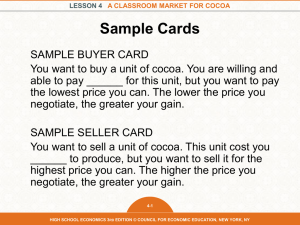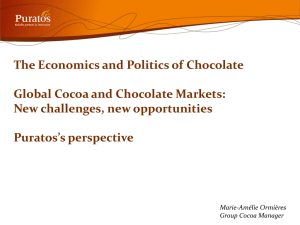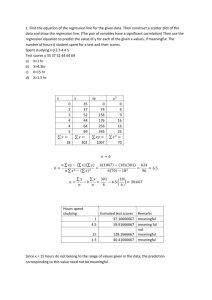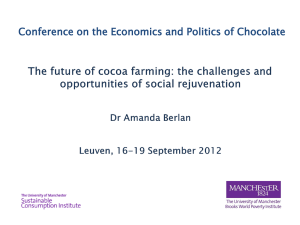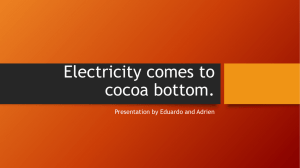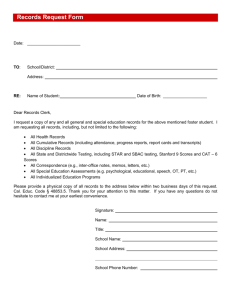Handout - amatyc
advertisement
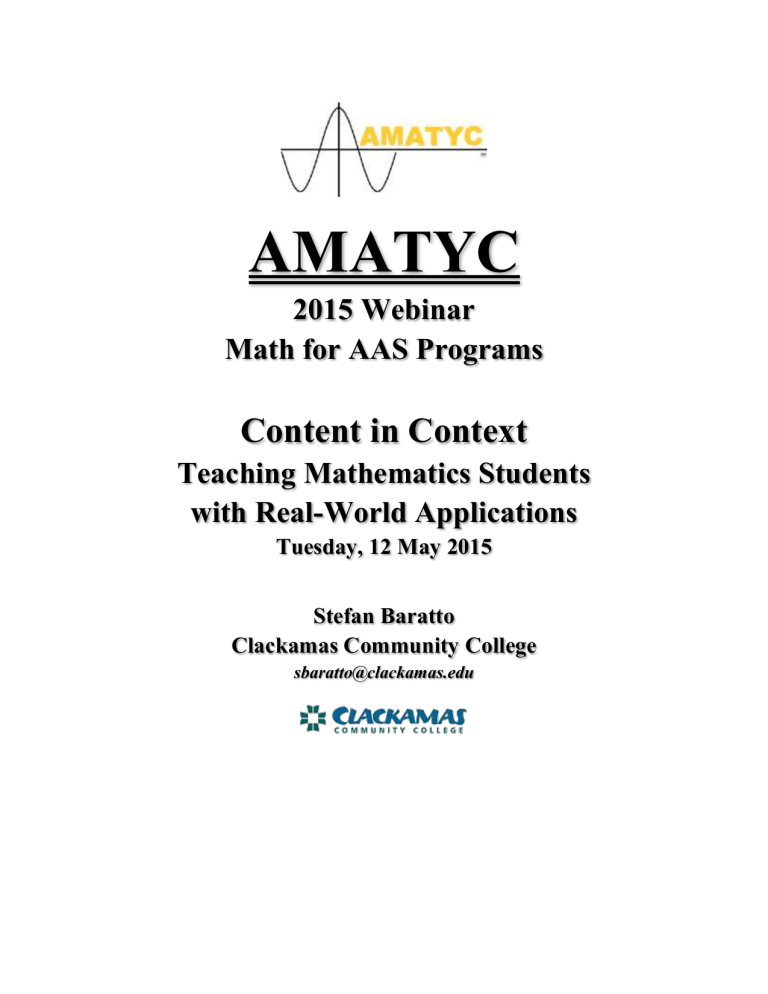
AMATYC 2015 Webinar Math for AAS Programs Content in Context Teaching Mathematics Students with Real-World Applications Tuesday, 12 May 2015 Stefan Baratto Clackamas Community College sbaratto@clackamas.edu Activity: Wason Selection Tasks Four cards are laying on a table. Each card has a letter of the alphabet on one side and a number on the other side. You are given the rule: If there is a vowel on one side of the card, then there must be an even number on the other side. You are to determine which (if any) of the cards must be turned over in order to determine whether the rule is being followed. You want to flip the minimum number of cards necessary to accomplish this. The cards on the table are as follows: T 6 E 9 You want to turn over the fewest number of cards possible to determine whether the rule is being followed. For each card, determine if you need to turn it over, and write a short sentence justifying your choice. As a bartender in an all-ages club that serves alcohol, your job is to ensure compliance with the following rule: Patrons under 21 may not drink alcohol. Toward that end, you may ask an individual their age, or check what they are drinking, but you may not be more intrusive than absolutely necessary. Four people sitting at the bar are shown below. #1: Drinking Water #2: Over 21 #3: Drinking Beer #4: Under 21 In which cases (if any) should you ask a patron’s age or determine what beverage they are consuming? For each patron, write a short sentence justifying your choice. Answers T: No. The rule says nothing about a consonant. 6: No. The rule implies nothing about an even number. E: Yes. If there is an odd number on the other side, then the rule is violated. 9: Yes. If there is a vowel on the other side, then the rule is violated. #1: Drinking Water: No. Anyone can drink water. #2: Over 21: No. Over 21 can drink anything. #3: Drinking Beer: Yes. Under 21 would be a rule violation. #4: Under 21: Yes. Drinking alcohol would be a rule violation. Activity: Reading Percent Problems Definition: Base, Amount, and Rate The base B is the whole in a problem. It is the standard used for comparison. Often, the base is the initial quantity and may be paired with the word “of.” The amount A is the part of the whole being compared to the base. The amount is often paired with the word “is.” The rate R is the ratio of the amount to the base. The rate is usually given as a percent. Most any percent problem comes down to finding one of these three elements. Given two of them, we can always find the third. The first step is to identify the elements in a problem. Example 1: Identifying the Elements of a Percent Problem Identify B, A, and R in the statement: $40 is 20% of $200. B $200 We began with this. A $40 $40 is a part of the original base. R 20% 20% is the percent. Often, it will be written as 0.20. Example 2: Identifying the Elements of a Percent Problem with an Unknown Identify A, R, and B in the following percent problem. 60% of the 80 students who took MTH 050 last term are now working. How many are working? R 60% B 80 60% is the percent. The base is 80 students; this is the total number of students we began with. We do not know how many of the original number (80) that are working. A is unknown. A state adds a 7.25% sales tax to the price of most goods. If a 30-GB iPod is listed for $299, how much will it cost after the sales tax has been added? If we use the price, including tax, as the unknown amount, then the rate is R 107.25% 1.0725 The base is the list price, B $299. We use the percent relationship to solve the problem. A RB 1.0725 299 R B 320.6775 Because our answer refers to a selling price, we round to two decimal places. The iPod sells for $320.68, after the sales tax has been included. Note: We could use R 7.25%, but then, after computing the amount, we would need to add it to the original price to get the actual selling price. Activity: Distributing a Negative Funghi Books pays $6.27 for each copy of The Forager’s Mushroom Cookbook (wholesale cost). They estimate that the weekly cost of selling the book is $285. The bookstore sells each copy for $14.95. (a) Write an expression that describes the revenue Funghi Books earns from selling this book. Let x be the number of books sold. 14.95x (b) How much does the bookstore bring in if they sell 75 copies one week? 14.95 75 1,121.25 They bring in $1,121.25 if they sell 75 copies. (c) Write an expression for the weekly cost of selling this book. 6.27 x 285 (d) How much does it cost the bookstore to sell 75 copies in one week? 6.27 75 285 755.25 It costs the store $755.25 to sell 75 copies in a week. (e) Construct a simplified profit model for the sale of this book. 14.95 x 6.27 x 285 14.95 x 6.27 x 285 8.68 x 285 (f) How much profit does the store earn if they sell 75 copies in one week? 8.68 75 285 366 They earn $366 if they sell 75 copies in a week. Activity: Functions in Developmental Math A student’s course grade is determined by adding up the total number of points the student earned that term and dividing by the total number of points available. This number is then multiplied by 100 to put the student’s raw score on a 100-point scale (assume there is no extra credit available). A computer program assigns a letter grade to the student based on their raw score. It assigns A for raw scores between 90 and 100 B for scores greater than or equal to 80, but less than 90 C for scores greater than or equal to 70, but less than 80 D for scores greater than or equal to 60, but less than 70 F for scores less than 60 (a) What letter grade would be assigned to a student whose raw score is 92? (b) What letter grade would be assigned to a student whose raw score is 96? (c) Consider a set of students with raw scores 74, 86, 92, 86, and 96. What grades would be assigned to these five students? (d) Write the raw scores and letter grades from exercise (c) as ordered pairs. (e) In this context, are letter grades a function of raw scores? (f) Are raw scores a function of letter grades? (g) Use the definition of a function to justify your answers to exercises (e) and (f). (h) What is the domain and range of the function that assigns a letter grade to each raw score? Activity: Rates A Boeing 747 can travel 8,336 mi on one 57,285-gal tank of airplane fuel. (a) Report the gas mileage of this plane. 8,336 0.1455 57, 285 The plane gets 0.1455 miles to the gallon. (b) Report the passenger-miles flown if a Boeing 747 carries 156 passengers for one full tank. 156 8,336 1,300, 416 The plane flies 1,300,416 passenger-miles. (c) Report the passenger-miles per gallon. Compare this to your answer in (a). 1,300, 416 22.7 57, 285 The plane gets about 22.7 passenger-miles per gallon. This is a much more reasonable means of determining the plane’s fuel efficiency. (d) A Ford Explorer gets about 15 mpg. If the driver is the only person in the Explorer, how does its fuel efficiency compare to your answer in part (c)? The plane is more fuel efficient. (e) Compute the rate of gallons of fuel used by the plane per mile flown. 57, 285 6.87 8,336 The plane uses nearly 7 gal for each mile flown. Activity: Developmental Math and Statistics The total number of severe Atlantic hurricanes (Categories 4 and 5) are given for each five-year period. Severe Atlantic Hurricanes 1981-85 1986-90 1991-95 4 5 5 Source: National Weather Service 1996-2000 11 2001-05 14 2006-10 11 Construct a bar graph to display this information. Severe Atlantic Hurricanes 16 14 12 10 8 6 4 2 0 1981-85 1986-90 1991-95 1996-00 2001-05 2006-10 How many severe Atlantic hurricanes occurred between 2006 and 2010? There were 11 severe Atlantic hurricanes between 2006 and 2010. What was the percent increase in the number of severe Atlantic hurricanes between the periods 19962000 and 2001-2005 (to the nearest whole percent)? There was a 27% increase in the number of severe Atlantic hurricanes. Which period saw the largest increase over the period that came before it? The largest increase occurred between the 1991-1995 and 1996-2000 periods. Activity: Developmental Math and Statistics The table gives the cocoa bean production in a recent growing season, in millions of pounds, along with value of that season’s crop, in millions of dollars. Cocoa Bean Production and Value Production Share of Nation (millions of pounds) World’s Total Ivory Coast 2,706 34.75% Ghana 1,608 20.62% Indonesia 1,078 13.84% Cameroon 462 5.93% Nigeria 462 5.93% Brazil 363 4.66% Ecuador 286 3.67% Malaysia 70 0.90% Other 755 9.69% Source: International Cocoa Organization; IndexMundi Value (millions of dollars) $3,287 1,951 1,309 561 561 441 347 86 917 What was the world’s total production of cocoa beans that growing season? 7,788,000,000 lb of cocoa beans were grown. What was the total value of the world’s cocoa production that season? That year’s crop was worth $9,460,000,000 In a subsequent year, the Ivory Coast’s production fell to 2,688 million pounds. Find the percent decrease this represents (round to the nearest hundredth of a percent). The percent decrease was 0.67%. In that same year, Indonesia’s production increased to 1,760 million pounds. What percent increase does this represent (round to the nearest whole percent)? This was a 63% increase. Activity: Developmental Math and Statistics The pie chart shows the top cocoa producing nations in 2011. Cocoa Production 2011 Other 23% Ivory Coast 30% Brazil 5% Cameroon 6% Ghana 16% Indonesia 20% Source: U.N. Food & Agricultural Organization Which country was the largest cocoa bean producer in 2011? What percent of the world’s cocoa beans were grown by this country? The Ivory Coast was the largest producer with 30% of the world’s total production. A global total of 8,980 million pounds of cocoa beans were grown in 2011. How many pounds did Cameroon produce? Cameroon produced about 539,000,000 lb of cocoa beans in 2011. Activity: Real-World Applications Mixture Problem A coffee reseller wishes to mix two types of coffee beans for the House Blend. The Kona bean that she wants to use wholesales for $4.50 per pound; the Sumatran bean wholesales for $3.25 per pound. If she wishes to mix 200 pounds of beans for a wholesale price of $4 per pound, how many pounds of each type of coffee bean should she include in the mix? Minh splits his $20,000 investment between two funds. At the end of a year, one fund grows by 3.25% and the other grows 4.5%. If the total earnings on his investment came to $793.75, how much did he invest in each fund? Currently, 8% of a 42-gal mixture of patching compound is water. Local conditions require the mixture to be 13% water. How much water needs to be added to the mix in order for it to be 13% water (accurate to three decimal places)? What will the total volume of the mixture be after the water is added? Products A toy store is selling the Fisher-Price Rollin’ Rumblin’ Dump Truck at a 10% discount for $16.19. How much does the toy normally sell for? In order to make room for the new fall line of merchandise, a proprietor offers to discount all existing stock by 15%. How much would you pay for a Fendi handbag that the store usually sells for $229? A store sells a certain Kicker amplifier model for a car stereo system for $249.95. If the store pays $199.95 for the amplifier, what is their markup percentage for the item (to the nearest whole percent)? Activity: Teachable Moments & Critical Thinking Recall Funghi Books pays $6.27 for each copy of The Forager’s Mushroom Cookbook (wholesale cost). They estimate that the weekly cost of selling the book is $285. The bookstore sells each copy for $14.95. R x 14.95 x C x 6.27 x 285 P x 8.68 x 285 (a) How many do they need to sell if they need at least $750 in revenue? R x 14.95 x 14.95 x 750 750 50.17 14.95 51 Round up! x They need to sell 51 books in order to earn at least $750 in revenue. (b) How many can they sell if their costs cannot exceed $1,200? C x 6.27 x 285 6.27 x 285 1, 200 6.27 x 915 915 145.9 6.27 145 Round down! x They can sell up to 145 books without costs exceeding $1,200.
